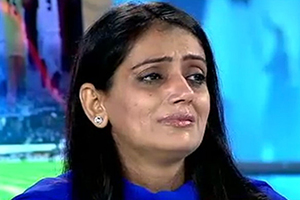Jun 1: Premier India pacer Jasprit Bumrah won't miss the hugs and high-fives as part of a wicket celebration but he will certainly miss applying saliva on the ball and feels an alternative should be provided to maintain the red cherry.
The ICC Cricket Committee, led by former India captain Anil Kumble, recommended a ban on using saliva on the ball as an interim measure to deal with the COVID-19 pandemic. However, the Committee did not allow the use of artificial substances as a substitute move.
The new rule makes life tougher for the bowlers and Bumrah, like many former and current fast bowlers, feels there ought to be an alternative.
"I was not much of a hugger anyway and not a high-five person as well, so that doesn't trouble me a lot. The only thing that interests me is the saliva bit," said Bumrah in a chat with Ian Bishop and Shaun Pollock on ICC's video series 'Inside Out'.
"I don't know what guidelines we'll have to follow when we come back, but I feel there should be an alternative," he added.
Bumrah said not being able to use saliva makes the game more batsman-friendly.
"If the ball is not well maintained, it's difficult for the bowlers. The grounds are getting shorter and shorter, the wickets are becoming flattered and flatter.
"So we need something, some alternative for the bowlers to maintain the ball so that it can do something - maybe reverse in the end or conventional swing."
When former West Indian pacer Bishop pointed out that the conditions have been favorable to the fast bowlers over the last couple of years, Bumrah nodded in agreement.
"In Test match cricket, yes. That is why it's my favorite format because we have something over there. But in one-day cricket and T20 cricket… one-day cricket there are two new balls, so it hardly reverses at the end.
"We played in New Zealand, the ground (boundary) was 50 metres. So even if you are not looking to hit a six, it will go for six. In Test matches I have no problem, I'm very happy with the way things are going."
He finds it amusing that the batsmen keep complaining about the swinging ball.
"Whenever you play, I've heard the batsmen - not in our team, everywhere - complaining the ball is swinging. But the ball is supposed to swing! The ball is supposed to do something! We are not here just to give throwdowns, isn't it? (laughter)
"This is what I tell batsmen all the time. In one-day cricket, when did the ball reverse last, I don't know. Nowadays the new ball doesn't swing a lot as well. So whenever I see batsmen say the ball is swinging or seaming and that is why I got out - the ball is supposed to do that.
"Because it doesn't happen so much in the other formats, it's a new thing for the batsmen when the ball is swinging or seaming," said the 26-year-old.
The Ahmedabad-born pacer finds himself in an unusual position as he has not bowled for over two months due to the lockdown imposed in the wake of the coronavirus outbreak.
When India will play next is not clear yet and Bumrah said he is not sure about how his body will hold up when he returns to action.
"I really don't know how your body reacts when you don't bowl for two months, three months. I'm trying to keep up with training so that as soon as the grounds open up, the body is in decent shape.
"I've been training almost six days a week but I've not bowled for a long period of time so I don't know how the body will react when I bowl the first ball.
"I'm looking at it as a way to renew your own body. We'll never get such a break again, so even if you have a small niggle here and there, you can be a refreshed person when you come back. You can prolong your career," he said.
Bumrah has risen rapidly in international cricket despite experts having reservations about his longevity due to his unorthodox action.
The gritty fast bowler sees similarities in his career graph to Swedish football star Zlatan Ibrahimovic.
"Our personalities are different. But the story I could relate to is that not many people thought he would make it big. There was a similar case with me growing up as well.
"Wherever I went, it was the general feedback from people that 'this guy would not do anything, he would not be a top-rated bowler, he won't be able to play for a long period of time with this kind of action'.
"So, having the self-belief is important and the only validation that is required is your own validation. I saw that in his (Ibrahimovic's) story, so that's the thing I could relate to," added Bumrah.






Comments
Add new comment